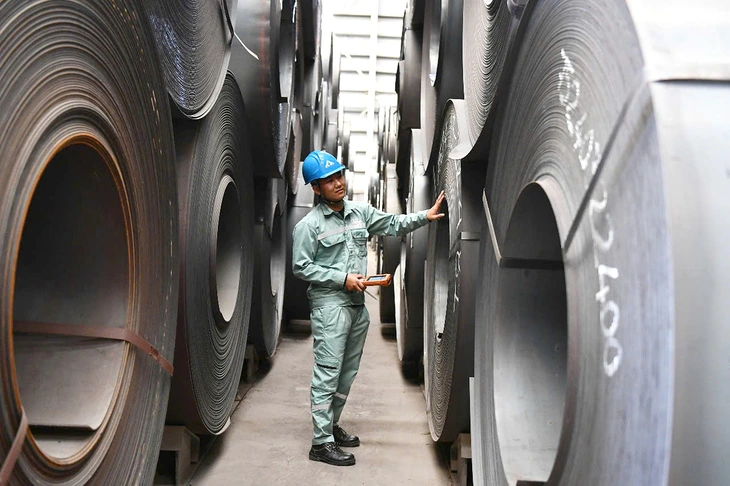
All aluminum and steel sold into the US will be subject to a 25% tax, which will have a significant impact on the global steel market, including Vietnam - Photo: N.NGHI
Although there are still opportunities before the impact of this tax policy, many businesses and associations of the steel and aluminum industry in Vietnam are still "holding their breath" waiting for the unpredictable developments of the US and the big players that will affect global trade.
Steel industry: chain difficulties
Mr. Dinh Quoc Thai, General Secretary of the Vietnam Steel Association (VSA), said that when informing the Ministry of Industry and Trade , the association said that due to strategic competition among major countries and disruption of the supply chain, the world steel market continued to witness decline and negative growth.
This has affected the Vietnamese market, despite positive support from warming domestic market demand.
"The recovery of the steel industry is still quite slow and has not yet reached its peak in 2021, and beyond that, nothing is certain. Specifically, the industry will continue to face challenges such as Chinese steel continuing to increase exports to Vietnam, domestic producers facing the risk of losing the domestic market and the situation of oversupply.
In addition, there is also the instability of the world market, broken supply chains, increased transportation and raw material costs, and changes in trade policies of major countries," Mr. Thai analyzed.
For the US market, in 2024, Vietnam will rank 8th in exporting steel products to this country with 938 million USD - an increase of nearly 159% compared to 2023 but only accounting for 3.1% of total turnover.
Regarding the countries subject to 25% tax, Mr. Thai said that in the short term, Vietnamese steel still has the opportunity to export to this market because domestic supply capacity (US) cannot meet the demand immediately and since 2018, most Vietnamese steel entering this market has been subject to 25% tax.
However, Mr. Thai said that this advantage could quickly disappear due to the US's trade defense investigation decisions. In 2024, this country initiated a dual anti-dumping and anti-subsidy investigation into corrosion-resistant steel, while Vietnamese steel enterprises are also facing many other lawsuits.
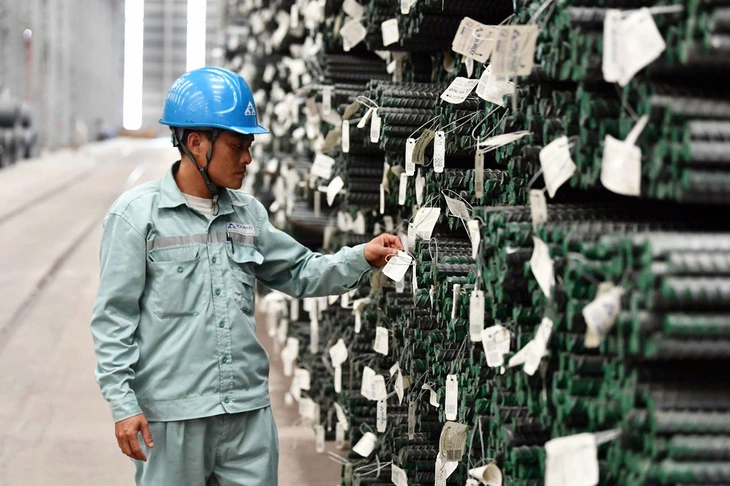
Steel businesses believe there are opportunities in the short term but will face difficulties in the long term - Photo: N.NGHI
Aluminum industry: both opportunities and difficulties
For aluminum businesses, the imposition of taxes also raises many concerns in the context of a market that is not really bright. A representative of the Vietnam Aluminum Association (VAA) said that in 2018, the aluminum industry was only subject to a 10% tax rate, but now this tax rate has increased to 25%.
With an export turnover of about 479 million USD, the US's increase in import tax has made aluminum industry businesses worried about their future export capacity because this country accounts for about 60% of the total turnover of the entire industry.
Accordingly, this person pointed out the challenges. That is, businesses directly affected by the policy will face the risk of reduced export orders and narrowed profits. In fact, business orders have temporarily slowed down since February 2025 to wait and see what the situation may be.
Along with that, the world price of raw aluminum is constantly fluctuating, "dancing" in response to policies, causing difficulties for Vietnamese aluminum manufacturers in planning to prepare raw materials.
However, VAA representatives also see opportunities. That is, the impact of this policy on most export markets is similar, except for Chinese goods, which are subject to an additional 10% tax, and Russian aluminum, which is subject to a 200% tax.
Therefore, if there are no exceptions, the competitiveness of Vietnamese aluminum products will not change much in international markets, but will have an advantage over Chinese products due to the risk of the US-China trade war continuing to escalate.
Another risk is the possibility of Chinese aluminum and steel products evading origin through Vietnam or ASEAN to avoid taxes from the US. VAA representatives warned that if not well controlled, Vietnamese businesses could be caught up in trade disputes.
When the export market decreases, Vietnamese aluminum factories with excess capacity will have to return to the domestic market, causing domestic pressure. Not to mention that Chinese factories with huge excess capacity will cause more goods to flood in, creating fierce competition.
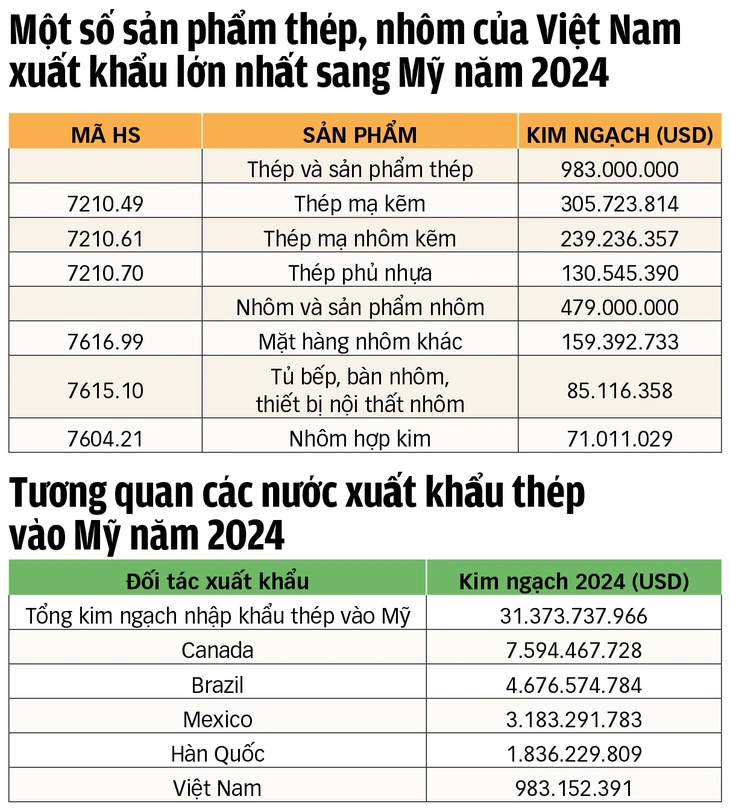
Source: United States International Trade Commission (USITC). Compiled by: N.AN
Efforts to reshape products and markets
Faced with this situation, many units have proactively proposed solutions. According to Mr. Dong Duc Trong - Deputy General Director of Chinh Dai Industrial Company Limited, the company is working with the legal department in the US and in Vietnam to assess which HsCode codes will be affected.
This is also a new opportunity, instead of spending a lot of time on raw products, we can focus on high-value products and finished products for international customers.
Businesses are also proactively exploiting niche market opportunities, when the tax pie is "shared equally" among all countries. A steel industry enterprise said that the US's uniform tax policy could disrupt the supply chain of cheap steel from other countries, while domestic US production would find it difficult to immediately fill the gap.
"This is an opportunity for Vietnam to negotiate tax exemptions and take advantage of its comprehensive strategic partnership position with the US as in 2018," he said.
A representative of a large-scale company in the Vietnamese steel industry said that the US's imposition of a 25% tax without exception helps create a fairer playing field and more equal competition opportunities than before.
"In a broader sense, we can now compete fairly with rivals that used to enjoy tax exemptions. Vietnamese steel exported to the US has been subject to a 25% tax since 2018, and we are used to it," he said.
When asked if its export plans to the US were disrupted, the company said that "everything is still running well, there have been no significant changes." The company also affirmed that it would expand its business, focusing on conquering golden markets such as ASEAN and the EU, where steel demand is skyrocketing.
According to businesses, in the current situation they can still expect the domestic market if they can take advantage of the wave of public investment in building infrastructure, social housing , high-speed railways, and airports that are about to start.
This could be a "gold mine" for domestic steel consumption. Along with that, the Government 's active support to restore the real estate, construction and consumer markets will help stimulate domestic demand and help businesses increase their market share at home.
A representative of Hoa Phat Group said that it always focuses on the domestic market by maintaining the proportion of steel sold domestically at about 70%. In addition, to reduce risks, this enterprise also diversifies its export markets to 40 countries and territories.
Market diversification helps Hoa Phat not to be too dependent on one market, limiting the impact of adverse fluctuations.
At the same time, when facing more and more trade defense lawsuits, this group has taken measures such as training skills for its staff, learning about export market information and making financial records transparent, ready to respond if sued...
Concerns about cheap steel from China
There are concerns that steel from previously tariff-free markets will flood into Vietnam when there is excess supply. However, a business leader said that this is unlikely as the cost of moving to Vietnam is higher.
However, the massive influx of cheap steel from China has left galvanized steel businesses feeling like they are sitting on hot coals, waiting for Vietnam's tariff defense moves such as AD19 - anti-dumping investigation on galvanized steel and A20 - anti-dumping investigation on hot-rolled steel.
Up to now, A19 professional groups have not received specific information on anti-dumping tax from the authorities, making it more difficult to deal with Chinese steel in the current context.
Foreign steel "attacks" domestic market?
Many large economies with modern steel production technology such as Japan, South Korea, Mexico, Canada... are subject to a 25% tax, which will continue to impact the global steel trade flow.
According to businesses, the US tax policy not only has a direct impact but also creates a domino effect. Countries that were previously exempted from tariffs such as Canada, Mexico or Brazil may shift their competition to other markets of Vietnam such as Europe, Japan, South Korea, or even target the domestic market. This increases pressure on domestic businesses.
In fact, Chinese steel is also flooding the Vietnamese market after being taxed by the US. In the context of excess capacity, countries will also increase protectionist measures and Vietnamese steel will face more difficulties when exporting to other countries.
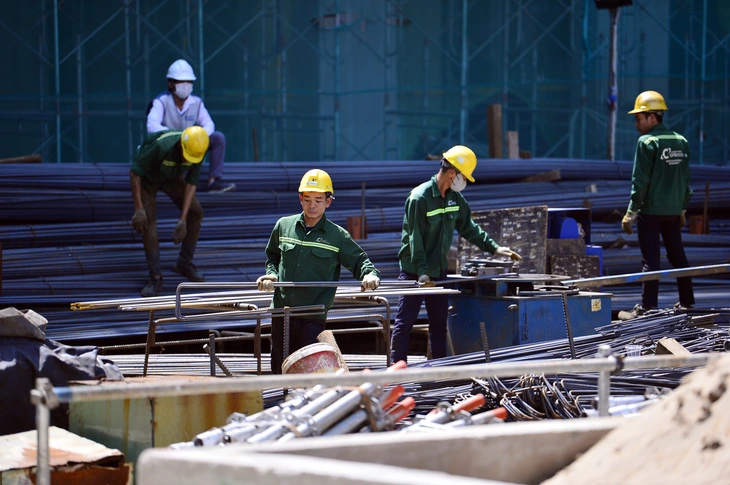
According to businesses, there is still hope for the domestic market if they can take advantage of the wave of public investment in infrastructure construction - Photo: QUANG DINH
State and business act together
According to the Vietnam Commodity Exchange, although the US tax policy has a domino effect on the global supply chain, the market is still able to absorb steel supply. Enterprises should not be too concerned but should proactively improve internal capacity, innovate technology, produce high-end products, and optimize costs to increase profit margins.
In another development, according to Tuoi Tre, Minister of Industry and Trade Nguyen Hong Dien led a delegation from the ministry to the US to work on issues related to trade exchange and economic cooperation between the two countries from March 12.
Previously, answering Tuoi Tre's question about the impact of US trade policies on Vietnam, Deputy Minister of Industry and Trade Nguyen Sinh Nhat Tan said that Minister Dien will directly meet with the head of the US Trade Representative (USTR) to "discuss and continue the very good relationship between Vietnam and the US".
According to the source, along with the discussion with the USTR chief representative, the Minister of Industry and Trade will also work with many relevant agencies of this country to continue discussing issues that the Vietnamese Embassy in the US and the Vietnam Trade Office in the US have continuously worked on, conveying the message to the US about the desire to maintain and build a harmonious, sustainable, and mutually beneficial economic and trade relationship.
Vietnam does not have any policies that would harm US workers or national security.
Many businesses and associations expect that the Minister of Industry and Trade's trip this time will bring good results for the US's tax and trade policies with Vietnam and promote trade relations between the two countries, promoting the advantages of the two complementary economies.
This expectation comes from the fact that Vietnamese goods exported to the US mainly compete with third countries, not directly with US businesses, and also create conditions for US consumers to use cheap Vietnamese goods.
Previously, sending a warning to associations and businesses, the Vietnam Trade Office in the US said that the US will apply an additional 25% tax on imported aluminum and steel, which will have a negative impact on countries exporting aluminum and steel to the US in the near future.
Currently, the US depends on the import demand for steel (accounting for 12-15%) and aluminum (accounting for 40-45%), so if the US applies it to all imported goods, Vietnam will still have many opportunities to continue exporting because in reality, the production capacity of US steel and aluminum manufacturers cannot immediately meet domestic demand.
However, the profit margin of export enterprises will decrease.
According to experts, the decision to impose a 25% tax on aluminum and steel imported into the US took place during the first term of US President Donald Trump in 2018, but this time it was more severe with the removal of all incentives previously given to partners such as Canada, Mexico, the EU or Japan.
Many steel exporting enterprises to the US said that this is a challenge but also an opportunity for enterprises to focus on more valuable and higher quality products to meet the international market for steel products.
Deputy Minister Nguyen Sinh Nhat Tan also shared that the Ministry of Industry and Trade has proactively coordinated with industries to prepare to respond to different scenarios.
However, to cope with fluctuations and difficulties, in addition to efforts from the Government, ministries and sectors must also rely on the sensitivity, proactiveness in following the market and the ability to adapt, explore and develop the competitiveness of the enterprises themselves.
Accordingly, he recommended that businesses continue to proactively develop roadmaps and solutions to diversify export markets, improve product quality, ensure technical, labor and environmental standards, etc.
It is especially necessary to focus on controlling the origin of raw materials for production, as well as carefully evaluating investment cooperation with businesses from countries that are having trade tensions with the US.
How do countries react?
According to CNN, this tax move will help Washington create a more level playing field for domestic manufacturing but risks pushing up prices of many consumer and industrial goods.
Any product "related" to aluminum and steel is also affected.
Reuters news agency reported that the new tariffs imposed by US President Donald Trump will affect a series of products made from aluminum and steel, with a total import value of up to 147.3 billion USD. Of which, aluminum components for cars, trucks, buses, tractors and other specialized vehicles will be subject to tariffs of up to 25 billion USD.
Tariffs also target $15 billion worth of metal furniture products, along with other key construction and engineering materials .
In addition, household appliances such as stainless steel sinks, aluminum pans, and gas stoves are also on the list of taxed items. Some other specific products such as rivets, bolts, and horseshoes are also not outside the scope of the 25% tax.
According to data from the US Department of Commerce, the country imported a total of $31.3 billion worth of iron and steel, along with $27.4 billion worth of metals in 2024.
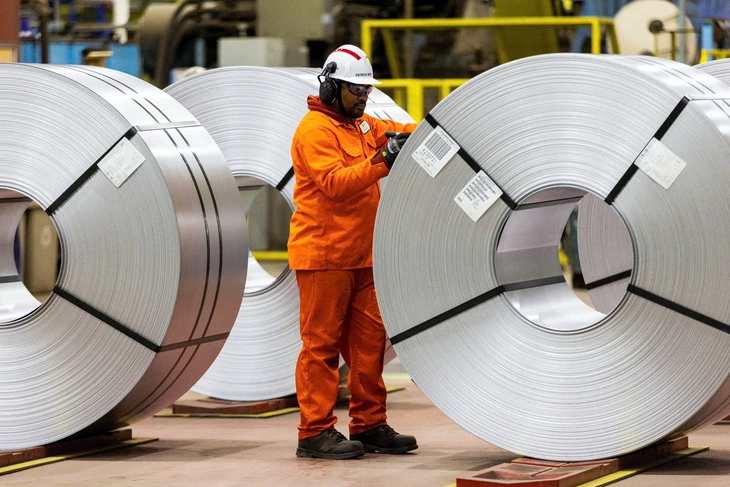
A worker in Canada inspects a steel coil before incoming Canadian Prime Minister Mark Carney visits the factory - Photo: Reuters
Canada, EU impose other tariffs in retaliation
Canada was the largest export partner for steel, aluminum and metals to the United States last year, with total exports of $11.4 billion for aluminum and $7.6 billion for iron and steel.
For aluminum, other major suppliers to the US include China, Mexico and the United Arab Emirates (UAE). Meanwhile, for steel, the US's top trading partners are Brazil, Mexico and South Korea.
Immediately after the US 25% tax rate officially took effect, many countries immediately made strong statements and retaliatory moves against Washington's export goods.
On March 12, Canada announced that it would impose a 25% reciprocal tariff on more than $20 billion worth of imported goods from the United States, including steel, aluminum and other items such as computers, sports equipment, water heaters and cast iron products.
According to Canadian Finance Minister Dominic LeBlanc, this tax will take effect from March 13.
Notably, these new tariffs are in addition to the 25% tariffs that Ottawa imposed on $30 billion worth of US goods on March 4 in response to Mr. Trump's previous tax policy.
Products subject to the tax include orange juice, peanut butter, wine, beer, coffee, household appliances, clothing, shoes, motorbikes, cosmetics, wood pulp, paper...
In addition to Canada, the European Union (EU) also criticized Mr. Trump's new tariffs, accusing the policy of being "unjustified" and immediately announced retaliatory tariffs on US exports worth $28 billion, including bourbon, motorcycles and yachts. These measures will take effect in early April.
"We regret that we have to take this measure. Tariffs are just taxes. They are bad for businesses and worse for consumers. They disrupt supply chains and destabilize the economy," said European Commission President Ursula der Leyen.
Mexico waits until April 2
Mexican President Claudia Sheinbaum said the country will wait until April 2 to decide whether to respond to US steel and aluminum tariffs.
It is known that this is also the time when the 25% tax that Washington announced to impose on all imports from Canada and Mexico is expected to take effect, after two delays since the original plan on February 1.
Australian Prime Minister Anthony Albanese, although criticizing the tax as "completely unreasonable" and "contrary to the spirit of friendship between the two countries", still affirmed that the country would not impose retaliatory tariffs.
Source: https://tuoitre.vn/my-danh-thue-25-nganh-nhom-thep-viet-nam-lam-gi-de-vuot-kho-20250314084440525.htm





































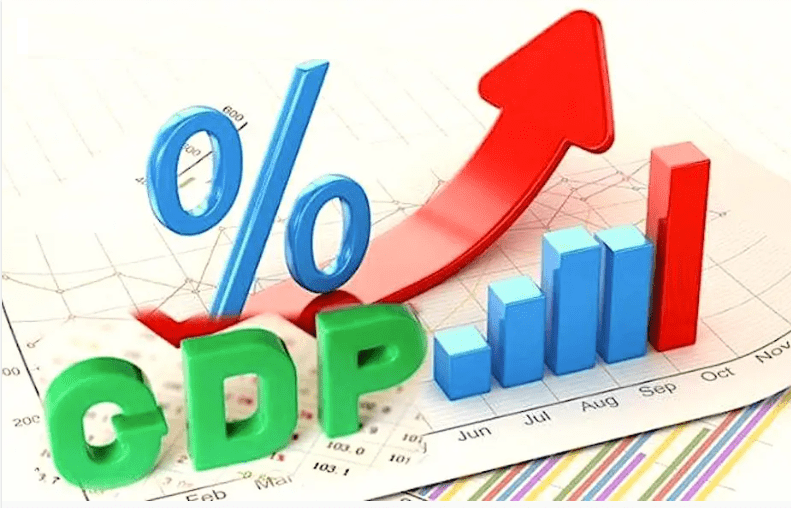

Comment (0)